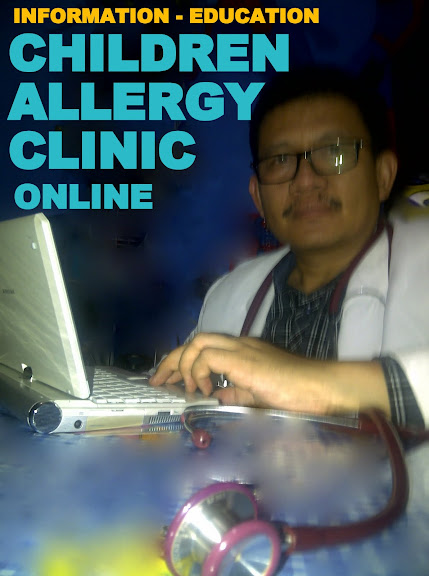Antenatal Steroids No Benefit in Late Preterm Neonates
Widodo Judarwanto. Children Allergy Online Clinic, Jakarta Indonesia
When testing indicates fetal lung immaturity at 34 weeks’ gestation or more, administration of antenatal corticosteroids does not reduce respiratory problems in the newborn, and the better approach is expectant management to prolong gestation as long as possible. Not only does steroid administration appear to have no benefit when administered in the late preterm and early term period, but our findings suggest it may actually be harmful.
The use of antenatal corticosteroids to prevent RDS in preemies born at less than 34 weeks’ gestation is widely supported, but the research team says little is known about the pros and cons of this approach when there is a risk of preterm delivery after 34 weeks.
To look into this issue, the team compared outcomes in 362 neonates born between 34 and 38 weeks of gestation after fetal lung maturity testing.
The 184 women with mature fetal lung indices were delivered within a mean of 1.7days. Among the group with immature fetal lung indices, 102 were treated with antenatal corticosteroids and delivered after a mean of 3.4 days, while the other 76 women in this group were managed expectantly without corticosteroids and delivered after an average of 10.9 days.
Rates of adverse neonatal respiratory outcomes were 3.3% in the mature-lung group, 9.8% in the immature-lung group given antenatal steroids, and just 1.3% in the immature-lung group managed expectantly, the investigators found.
Furthermore, according to the report, the adjusted odds ratio for a composite of adverse neonatal outcomes among the infants with immature fetal lung indices was 0.59 for those managed expectantly compared to those born after antenatal corticosteroids.
Recent cohort studies showing that the greatest benefit of antenatal corticosteroids is in neonates born between 29 to 34 weeks of gestation, and is much less for those born at either extreme of preterm gestation.
The recommended that if delivery is indicated based on the maternal or fetal condition before 39 weeks of gestation, after careful consideration of the risks to the mother and fetus, the mother’s pregnancy should be managed as such without the introduction of possible additional morbidity by administration of antenatal corticosteroids until further evidence is available from randomized controlled trials.
References:
Kamath-Rayne BD, et al. Antenatal steroids for treatment of fetal lung immaturity after 34 weeks of gestation: an evaluation of neonatal outcomes. Obstet Gynecol. 2012 May;119(5):909-16.
Abstract References:
Antenatal steroids for treatment of fetal lung immaturity after 34 weeks of gestation: an evaluation of neonatal outcomes.
Kamath-Rayne BD, et al. Obstet Gynecol. 2012 May;119(5):909-16.
Source: From Neonatology and Pulmonary Biology, Cincinnati Children’s Hospital Medical Center, Maternal-Fetal Medicine, University of Cincinnati School of Medicine, and Maternal-Fetal Medicine, Tri-Health, Cincinnati, Ohio.
Abstract
OBJECTIVE: : To estimate whether antenatal corticosteroids given after fetal lung immaturity in pregnancies at 34 weeks of gestation or more would improve neonatal outcomes and, in particular, respiratory outcomes.
METHODS: : We compared outcomes of 362 neonates born at 34 weeks of gestation or more after fetal lung maturity testing: 102 with immature fetal lung indices were treated with antenatal corticosteroids followed by planned delivery within 1 week; 76 with immature fetal lung indices were managed expectantly; and 184 were delivered after mature amniocentesis. Primary outcomes were composites of neonatal and respiratory morbidity.
RESULTS: : Compared with corticosteroid-exposed neonates those born after mature amniocentesis had lower rates of adverse neonatal (26.5% compared with 14.1%, adjusted odds ratio [OR] 0.51, 95% confidence interval [CI] 0.27-0.96) and adverse respiratory outcomes (9.8% compared with 3.3%, adjusted OR 0.33, 95% CI 0.11-0.98); newborns born after expectant management had significantly less respiratory morbidity (1.3% compared with 9.8%, adjusted OR 0.11, 95% CI 0.01-0.92) compared with corticosteroid-exposed newborns.
CONCLUSION: : Administration of antenatal corticosteroids after immature fetal lung indices did not reduce respiratory morbidity in neonates born at 34 weeks of gestation or more. Our study supports prolonging gestation until delivery is otherwise indicated.
LEVEL OF EVIDENCE: : II.
Provided by
 CHILDREN ALLERGY CLINIC ONLINE
CHILDREN ALLERGY CLINIC ONLINE
Yudhasmara Foundation htpp://www.allergyclinic.wordpress.com/
- CHILDREN GROW UP CLINIC I JL Taman Bendungan Asahan 5 Jakarta Pusat, Jakarta Indonesia 10210 Phone : (021) 5703646 – 44466102
- CHILDREN GROW UP CLINIC II MENTENG SQUARE Jl Matraman 30 Jakarta Pusat 10430 phone 44466103 – 97730777
WORKING TOGETHER FOR STRONGER, SMARTER AND HEALTHIER CHILDREN BY EDUCATION, CLINICAL INTERVENTION, RESEARCH AND INFORMATION NETWORKING. Advancing of the future pediatric and future parenting to optimalized physical, mental and social health and well being for fetal, newborn, infant, children, adolescents and young adult
CLINICAL INTERVENTION AND MEDICAL SERVICES “CHILDREN GRoW UP CLINIC”
PROFESSIONAL CLINIC “CHILDREN GRoW UP CLINIC”
|
Clinical and Editor in Chief :
Dr Widodo Judarwanto, pediatrician email : , Curiculum Vitae
Information on this web site is provided for informational purposes only and is not a substitute for professional medical advice. You should not use the information on this web site for diagnosing or treating a medical or health condition. You should carefully read all product packaging. If you have or suspect you have a medical problem, promptly contact your professional healthcare provider.

Copyright © 2012, Children Allergy Clinic Online Information Education Network. All rights reserved











